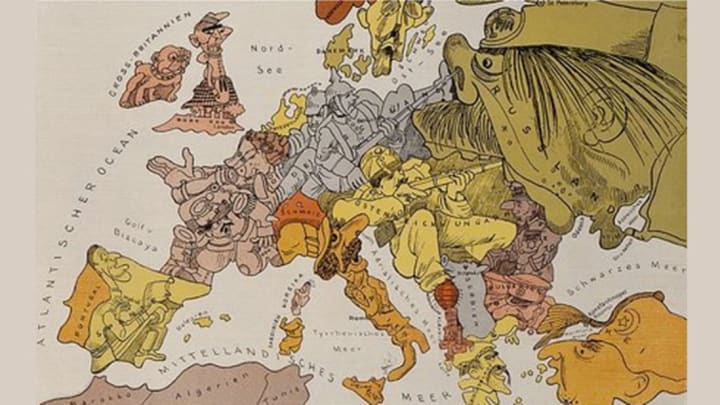The First World War was an unprecedented catastrophe that killed millions and set the continent of Europe on the path to further calamity two decades later. But it didn’t come out of nowhere. With the centennial of the outbreak of hostilities coming up in August, Erik Sass will be looking back at the lead-up to the war, when seemingly minor moments of friction accumulated until the situation was ready to explode. He'll be covering those events 100 years after they occurred. This is the 106th installment in the series.
March 2, 1914: German Newspapers Beat the War Drums
“Two years ago there was hesitation, but now it is said openly even in official military journals that Russia is arming itself for a war against Germany,” the Kölnische Zeitung (Cologne Gazette) warned its readers in a hair-raising article, “Russia and Germany,” published on March 2, 1914. The inflammatory article sparked alarm across Europe, fueling fears in Russia, France, and Britain that the German government was preparing its public for war.
There was reason for fear: Many European newspapers were semiofficial mouthpieces, and it was widely known that the Kölnische Zeitung was often “inspired” by German officials, who either wrote articles under pseudonyms or provided sensitive information to publicists and journalists. In this case the article was supposedly written by the German military attaché in St. Petersburg, Oberleutnant Richard Ulrich, or perhaps a pan-German publicist with access to Ulrich.
Whoever wrote it, the article painted a terrifying picture of Russian military development, apparently on track to achieve superiority over Germany in the next few years thanks to the Great Military Program, expanding Russian land forces, artillery, and railroads to speed mobilization. According to the author, “the purely geographical deployment of these arms points to the western border, thus toward Germany.” The article also condemned anti-German agitation in Russia’s pan-Slav press and complained of Russian ingratitude for Germany’s efforts to restrain its ally Austria-Hungary during the recent Balkan crises. Summing up, the author warned that Germany had to prepare herself for conflict in the not-too-distant future, as Russia would be ready to attack in the fall of 1917.
Vast and backward, Russia was already a bogeyman across the German political spectrum. German liberals and socialists deplored Russia’s reactionary Tsarist regime, while the conservative aristocrats who ran the Second Reich feared Russian territorial designs in German East Prussia and the northeastern provinces of Austria-Hungary, where Slavs predominated. Many educated Germans also embraced social Darwinist views that held Germans superior to Slavs and forecast an impending “racial struggle” between them. In strategic terms the chief of the general staff, Helmut von Moltke, was concerned that Russian efforts to accelerate mobilization would upset the Schlieffen Plan, which allotted six weeks to deal with France on the assumption Russian forces would take at least that long to get ready.
Embarrassed by the controversy resulting from the article, the Imperial Government disavowed any connection with the Kölnische Zeitung—but archival evidence confirms that this was indeed the strategic outlook in the top echelons of the German government. When the German ambassador to St. Petersburg, Count Friedrich Pourtalès, wrote a report arguing the situation wasn’t as dire as the article suggested, Kaiser Wilhelm II scribbled in the margins, “then you are mistaken,” adding, “According to all my reports, I as a military man harbor not the slightest doubt that Russia is systematically preparing for war against us; and I direct my policy accordingly.”
Meanwhile a number of German newspapers, all sympathetic to the military, amplified the message with warnings of their own. On February 24, 1914, the Berliner Post called for a preemptive strike to break through the Triple Entente’s encirclement before it was too late: “At the moment the state of things is favorable for us. France is not yet ready for war. England has internal and colonial difficulties, and Russia recoils from the conflict because she fears revolution at home. Ought we to wait until our adversaries are ready?” Instead Germany should “prepare for the inevitable war with energy and foresight” and then “begin it under the most favorable conditions.” In early March another newspaper, Die Post, echoed the call for a preemptive war, and the usually moderate Berliner Tageblatt asserted “we wish to keep the peace as long as possible with our great neighbor, but that is no reason to why we should continue to yield before his arrogant pretensions.” Finally, on March 14, the ultranationalist Alldeutsche Blätter warned its readers: “We maintain, today more than ever, that Germany and Austria-Hungary, even with the most honorable desire for peace, can not avoid war with their eastern and western neighbors; that a frightful, decisive struggle will be forced upon them.”
Some historians have contended that European newspapers helped push the continent into war by pressuring their respective governments to take aggressive stances, but it was more likely the other way around, as governments used newspapers to whip up public support for confrontational policies. That’s certainly how it looked to Eyre Crowe, a veteran British diplomat, who wrote on March 16, 1914: “No German government, nor the Emperor, will be driven into war by popular clamour. On the contrary, the necessary popular clamour will be engineered by the German government if it wishes to go to war. Public opinion alone is of no account whatever.”
The Triple Entente were in no mood to be bullied: on March 12, 1914, Russian War Minister Sukhomlinov penned an anonymous response in the Birzhevye Vedmosti, a Russian financial newspaper, stating that Russia wanted peace—but was prepared for war. And the London Times opined: “If something were still necessary to pull the Triple Entente closer together, or to strengthen the decision of the French masses to maintain their three-years’ compulsory army service, nothing could be so effective as the articles that have been allowed to appear in the German press.”
See the previous installment or all entries.
